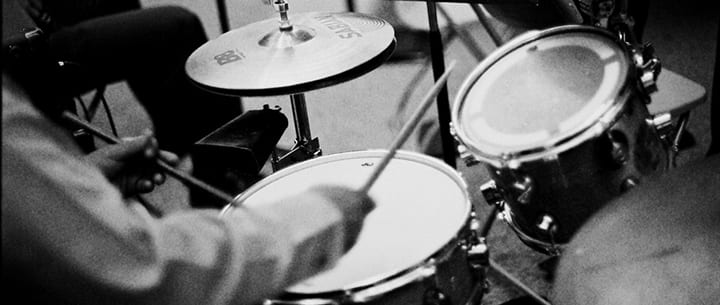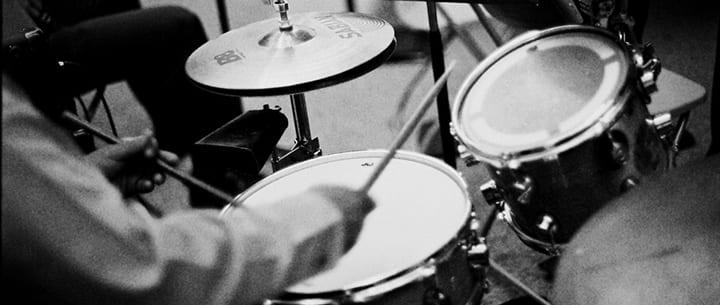 Are the drums your favorite instrument? It’s no surprise that you want to learn how to replicate the complicated off-beats and insane rolls you hear your favorite drummers pull off with ease. After all, the drummer is the backbone of the band, the foundation on which all other musicians build their music. But is it possible to teach yourself drums, or should you hire a professional instructor? Use this guide to get started and make that decision for yourself.
Are the drums your favorite instrument? It’s no surprise that you want to learn how to replicate the complicated off-beats and insane rolls you hear your favorite drummers pull off with ease. After all, the drummer is the backbone of the band, the foundation on which all other musicians build their music. But is it possible to teach yourself drums, or should you hire a professional instructor? Use this guide to get started and make that decision for yourself.
Buy a Drum Set
Before you can begin, you’ll need an instrument! Until you’re sure that drums are the right instrument for you, choose a basic, beginning drum set. Expect the required investment to be about $300 to $500. Buying a beginner drum set gives you time to develop your style and learn what you really need before you spend thousands on the perfect drums. Your basic set should include:
-
Bass drum with pedal and mounted tom drum
-
Snare drum and stand
-
Floor tom drum
-
Crash-ride cymbal and stand
-
Hi-hat cymbals and stand
-
Stool (also known as the drummer’s throne)
Also, don’t forget the drum sticks and drum key to tune the heads. If in doubt, choose 5B drum sticks with a wood tip. These are the most popular because the length and diameter are pretty standard. As your skills grow and your needs change, you can experiment with different drum sticks and add more pieces to your drum set.
Keep in mind that digital drum sets are also available to teach yourself drums. These have pressure-sensitive pads that make no more than a light tapping sound, but with headphones on, you can rock out to different drum sounds, allowing for hours of fun as you customize your drumming with different songs.
Dive Right In
With your drum set assembled and beckoning you, go ahead and give in to temptation. Pop in a CD and dive right in, playing along to the beats you know well. You might laugh at your efforts to sound like a seasoned drummer on your very first attempt to teach yourself drums, but there’s nothing wrong with that. Now’s the time to adjust the height of your stool, move the cymbals around, and tweak the floor tom’s angle as needed.
Find Useful Resources
You’ve taken the first big steps. Now it’s time to get serious about learning to play the drums! That means finding resources that can teach you basic beats and rhythms, how to build your stamina, and so on. Some of our favorite resources to teach yourself drums include…
- Our YouTube Playlist: Add our playlist for beginning drummers to your bookmarks and try to watch one video per day in your practice sessions. It includes helpful tutorials and drum exercises to improve your technique and accuracy.
-
Vic Firth playalong tracks: Playalong tracks are incredibly useful for perfecting your drumming prowess. Vic Firth offers free downloads of PDFs with useful explanations and pictures, as well as drumming sheet music for some of your favorite songs. Free mp3 tracks with and without the drums let you practice with as little or as much help as you need. Vic Firth’s website is full of great resources, too.
Mel Bay percussion books: Mel Bay has been producing great instructional percussion books for over 50 years. Your local music store is likely to sell Mel Bay drumming technique books, but you can also download an eBook version from the website.
Alfred Music drums & percussion books: Alfred is another big name in musical technique books. Many books come with a CD, DVD, or video streaming access to enhance your learning experience and make it easier to teach yourself drums.
MusicRadar: Playing the drums isn’t all fun and games. You also need to take time to maintain your drum set if you want it to last. This resource has everything you need to know about sprucing up your drum set without accidently damaging anything.
Consider Hiring a Teacher
While books and Internet resources are incredibly valuable to teach yourself drums, there’s nothing that compares to meeting one-on-one with a teacher. Signing up for formal drum lessons will help you:
-
Ensure your drums are set up correctly: Yes, you can look up guides to get an idea of how to set up your drums, but you miss out on the option to ask someone who’s present in the room whether your setup is correct. You can move forward with confidence when a teacher is right at your side making adjustments to your drum set’s layout if needed.
-
Establish good technique: It’s easier to learn good technique the first time around. If you pick up information online and teach it to yourself incorrectly, you either hang on to that bad habit forever or you’re forced to retrain yourself if you decide to hire a teacher in the future. A teacher can pass on knowledge of stellar stick technique, foot positioning, and snare work so you get it right from the very start.
-
Get recommendations for additional learning materials: While you can find plenty of resources on your own, your teacher has years of experience and knows which books are truly the most effective. Some teachers lend you books for free as a benefit of taking lessons from them, which helps the cost of lessons pay for itself.
-
Receive personalized advice: Do an Internet search of which drum set or sticks are the best and you’ll come across plenty of contradicting information. Much of the time this is because someone is selling something. Your teacher genuinely wants you to succeed and will offer the best advice that years of experience can offer.
-
Learn to tune your drums: Tuning drums is an art that not all drummers master. Those who become teachers can show you the right way to tune your drums for a more appealing sound and longer equipment lifespan. It’s much easier to learn this important step with an experienced drum teacher by your side.
-
Be held accountable: It’s all too easy to slack off when you teach yourself drums. You might be enthusiastic at first but then lose the will to practice. A teacher will hold you accountable and guide you along at an appropriate pace.
-
Continue progressing: Perhaps you have some experience playing the drums, but you stopped taking lessons years ago. Without a teacher, it can be difficult to force yourself outside your comfort zone. After all, you already know this set of off-beats or those killer drum rolls; why would you go through the difficulty of learning something new when you can just mess around with what you’re already good at? Working with a teacher is the best way to challenge yourself and improve your skills beyond their current level.
Whether you’re a beginner or you’re looking to refine an old skill, it’s always better to work with an experienced teacher instead of trying to teach yourself drums. All the resources in the world are useless unless you learn to apply them correctly, and a good teacher is the key to accomplishing that. Good luck!
Photo by: Keenon Lindsey
Megan L.
